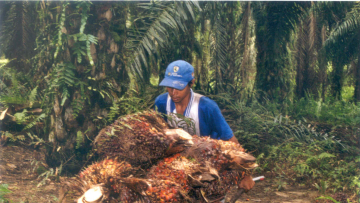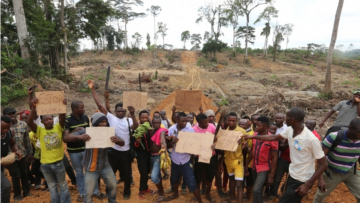Company – On record
This profile is no longer actively maintained, with the information now possibly out of dateBankTrack

Company – On record
This profile is no longer actively maintained, with the information now possibly out of dateBankTrack
Why this profile?
SOCFIN has a long record of harassing and forcefully evicting communities to develop oil palm and rubber plantations as well as causing deforestation and biodiversity loss.
SOCFIN develops and manages oil and palm rubber plantations, where biomass is used in biomass boilers to produce the heat and electricity needed for palm fruit processing. Additionally, they use biomass dryers which produce the head needed to dry natural rubber.
| Sectors | Agriculture for Palm Oil , Agriculture for Industrial Crops, Biomass Electric Power Generation |
| Headquarters |
|
| Ownership |
listed on Luxembourg Stock Exchange
The Bolloré Group is the largest shareholder of SOCFIN and owns 39.4% of the shares. |
| Subsidiaries |
|
| Website | http://www.socfin.com |
Société Financière des Caoutchoucs (SOCFIN) was founded in 1909 and is headquartered in Luxembourg. It is primarily active in cultivation and export of palm oil and rubber. As of 2017 SOCFIN has concessions covering 400,000 hectares of land in Africa and South East Asia, of which 64,000 hectares are planted with rubber plantations and 128,000 hectares are planted with palm oil plantations.
What must happen
Banks and other financial institutions should avoid financing SOCFIN or any of their subsidiaries that are connected to forced evictions, land grabs and deforestation.
Impact on human rights and communities
A long record of land grabs, forced eviction and harassment
SOCFIN and its subsidiaries have a long record of forcibly evicting communities from their lands and harassing them with the assistance of security forces. The company’s land acquisition practices and the deforestation it has caused have threatened commities’ food security and self sufficiency and caused land rights violations in several instances.
- In Sierra Leone, more than 32,000 people from 52 villages have lost land to SOCFIN’s plantations. In the Malen Chiefdom, 18,500 hectares of the 27,000-hectare chiefdom (70%) is part of SOCFIN’s concession (Fian Belgium, 2019). Since its foundation in 2011, members of the Malen Land Owners and Users Organisation (MALAO), created by peasants affected by SOCFIN’s operations, have faced intimidation by company security guards and local authorities and are arbitrarily arrested (World Rainforest Movement, September 2017). A land conflict in Malen that has been ongoing since SOCFIN’s arrival in 2011 reached a tipping point in January 2019 when two people were killed during protests and several were arrested.
- In Nigeria, the village of Makilolo was locked in by SOCFIN subsidiary Okomu Oil Palm’s security forces after residents resisted eviction, severely restructing their movements (World Rainforest Movement, March 2014). In 2015, the Edo State Government in Nigeria ordered the revocation of 13,750 hectares of land from Okomu Oil Palm, arguing that it was illegally acquired. The company ignored the revocation and continued clearing forests, which displaced 60.000 forest-depending people (Nigeria Tribune, June 2017).
- In Liberia, at least 37 villages have been affected by SOCFIN’s subsidiaries LAC and SRC. In the village of Lanco, villagers only heard that they would be displaced when SOCFIN’s empoloyees arrived to the villages with bulldozers and machetes to turn the land into plantations. A Bread for All report (2019) showed that SOCFIN’s Liberian subsidiary SRC (Salala Rubber Corporation) has nearly enclosed at least three villages, leaving no buffer zone, despite promising communities buffer zones of several hundred meters between the plantations and the communities.
- In Cameroon, farmers or communities near plantations of SOCFIN or its subsidiaries have reported to Bread for All of being accused of theft by security staff when harvesting their own palm oil or rubber trees. According to Fern (September 2018), small-scale farmers in Mbonjo, Cameroon who grow their own palm oil are forced to sell all the nuts they harvest to SOCFIN's subsidiary SOCAPALM and are not allowed to use the nuts for their own consumption. Security guards and the army are constantly observing people’s activity, and as reported by residents of Mbonjo, security forces have also attacked women and youth and broken into houses.
Inadequate compensation
Landowners who are evicted as a result of SOCFIN’s plantation developments often need to fight for compensation.
- In Liberia, SOCFIN’s subsidiary does not pay compensation for land but only perennial crops, plants and houses on that land.
- In Sierra Leone, SOCFIN only compensates landowners for the loss of land if palm oil is grown on it. the company does not compensate for any other cash crop (Bread for All, February 2019). Fian Belgium (2019) found that land owners in Sierra Leone receive USD 570 for a hectare of oil palm trees while SOCFIN values the price of a hectare of its own plantations at USD 57,120.
Sexual assault and harassment of women who applied for jobs as contract workers and who sold food to workers at the plantations has been reported by women in Liberia to Bread for All. In addition women stated that their superiors asked them for sex in order to obtain or to keep a job, and that they were denied work, left unpaid or fired when they refused.
Impact on nature and environment
Water pollution
Communities living near SOCFIN plantations report contamination of the rivers they are using for drinking water and large numbers of dead fish in those rivers. The extent of the contamination is often not adequately researched or shared with the public.
- In Sierra Leone, the River Malen, a major water source and fishing site for the Malen Chiefdom, is now considered one of the poorest river bodies for land-sourced nutrients of Sierra Leone. Communities have reported waste from SOCFIN’s processing mill in the water. SOCFIN’s use of chemicals and fertilizers has made swamps unsuitable for cultivation, building even more pressure on the already existing land shortage in the Malen Chiefdom.
- In Liberia, environmental permits require that if drinking water sources are polluted, alternative sources should be provided by the company, however SOCFIN’s Liberian subsidiary SCR does not test the water around its plantations nor provide alternative sources. Communities have reported to Bread for All that their drinking water is contaminated due to SRC and LAC plantations, and that the companies do not respect restrictions on spraying pesticides during the wet season.
Biodiversity loss
As of 2019 SOCFIN has no deforestation policy, although the development of rubber and palm oil plantations is leading to the destruction of biodiverse ecosystems around the world. In 2015 SOCFIN stated that it is ‘committing itself to integrate a Zero Deforestation policy’ but has not shown progress towards this goal.
A Greenpeace study into Socfin’s plantations in Cameroon and Liberia in May 2016 has documented the company’s impacts on forests and its presence in, and expansion into high conservation value forest where rare and endangered species are present. Communities in Malen in Sierra Leone also report declines in biodiversity and particularly mammals and medicinal plants.
ING arranged an issue of EUR 80 million in senior unsecured debt for SOCFIN in 2016 (Chain Reaction Research). Bolloré is the large shareholder of SOCFIN and owns 39.4% of its shares; the biggest bank financiers of Bolloré are BNP Paribas, Société Générale, Credit Mutuel, BPCE, Credit Agricole and ING (Forests & Finance).


